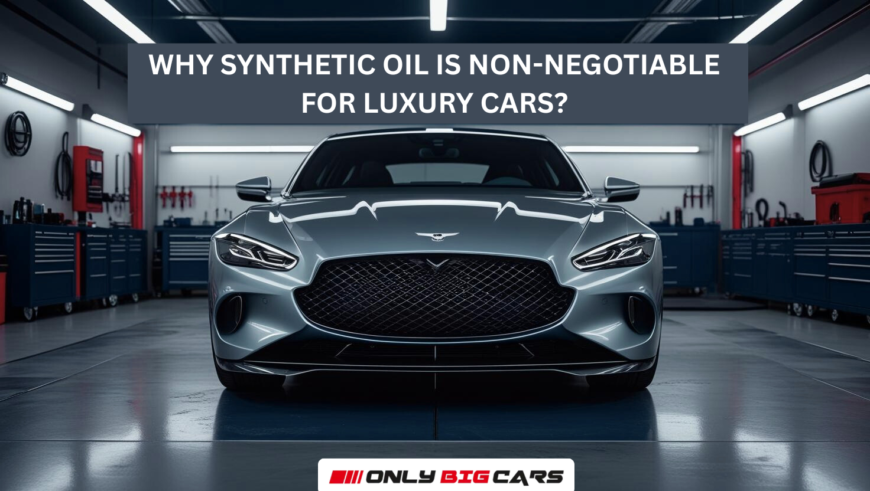When it comes to maintaining a luxury car, every small detail matters. From the type of tires to the grade of fuel, premium vehicles demand premium care. One often overlooked but absolutely crucial component is engine oil. Specifically, synthetic oil for luxury cars. If you’re driving a BMW, Audi, Mercedes-Benz, or any other high-end vehicle, switching to synthetic oil isn’t just a recommendation—it’s a necessity.
In this article, we’ll explore why synthetic oil is non-negotiable for luxury cars, the benefits it offers, and why skipping on it can cost you big in the long run.
What Is Synthetic Oil?
Synthetic oil is a man-made lubricant designed to offer superior performance compared to conventional (mineral-based) oils. While traditional oils are refined from crude oil, synthetic oils are chemically engineered to provide higher levels of purity and performance. They’re built to withstand extreme temperatures, reduce friction, and last longer than conventional oils.
Why Luxury Cars Need Synthetic Oil?
Luxury vehicles are engineered for performance, precision, and smooth operation. Their engines often feature turbochargers, tighter tolerances, and advanced components that operate under greater stress. Here’s where synthetic oil comes in.
High-Performance Engines Demand High-Performance Lubricants
Luxury cars are not your average vehicles. Brands like Porsche, Jaguar, and BMW are designed for speed, acceleration, and efficiency. These performance capabilities generate more heat inside the engine. Synthetic oil handles high temperatures better than conventional oil, reducing the risk of engine wear and tear.
Superior Protection in All Weather Conditions
Whether you’re driving in the summer heat or winter cold, synthetic oil adapts. It maintains the right viscosity (thickness) regardless of temperature changes, ensuring your engine runs smoothly year-round. This is especially crucial for turbocharged luxury engines that can experience significant stress during extreme weather.
Better Engine Cleanliness
Synthetic oil contains fewer impurities and more uniform molecules than conventional oil. This means it doesn’t break down as quickly and is more resistant to sludge and carbon buildup which is a common issue in high-performance engines. Cleaner engines run more efficiently and last longer, especially in luxury vehicles like Audi or Mercedes-Benz.
Longer Oil Change Intervals
Luxury cars are expensive to maintain but synthetic oil can help reduce some of that cost. Because of its durability, synthetic oil lasts much longer than mineral oil. While conventional oil might need a change every 5,000 km, synthetic oils can often go 10,000–15,000 km (depending on manufacturer specs and driving conditions), saving you time and money.
Improved Fuel Efficiency
Less friction inside the engine means the engine doesn’t have to work as hard. Synthetic oil reduces internal drag, which can slightly improve fuel economy. For heavy, powerful luxury vehicles that already consume more fuel, every bit of savings counts.
Enhanced Engine Longevity
Over time, the superior lubrication of synthetic oil protects critical engine components better than conventional oil. If you want your luxury car to stay in peak condition for years or even decades then synthetic oil is the smart choice.
Turbocharger and Supercharger Compatibility
Many modern luxury cars come equipped with turbochargers or superchargers. These components run at extremely high speeds and temperatures. Synthetic oil is specifically engineered to handle these stresses, ensuring consistent performance and protection.
Lower Emissions
Because it burns cleaner, synthetic oil contributes to lower engine emissions. It also helps improve combustion efficiency, which aligns well with eco-conscious luxury car owners looking to reduce their carbon footprint.
Quiet and Smooth Performance
Synthetic oil reduces friction so effectively that it minimizes engine noise and vibration. The result? A quieter, more refined driving experience—just what you’d expect from a high-end car.
Required by Manufacturers
It’s not just a suggestion, many luxury car manufacturers now require synthetic oil for warranty coverage. Using the wrong type of oil may void your warranty or lead to engine damage.
Disadvantages of Synthetic Oil for Luxury Cars
While synthetic oil offers plenty of benefits, it’s fair to consider a few drawbacks—though minor in comparison.
Higher Upfront Cost
Synthetic oil is more expensive than conventional oil. However, since it lasts longer and offers superior protection, it saves money in the long run through fewer oil changes and better fuel efficiency.
Overkill for Non-Performance Vehicles
If you own an older luxury car that doesn’t require high-performance lubrication, synthetic oil may be unnecessary. But for modern luxury vehicles, it remains the gold standard.
Incompatibility With Very Old Engines
Some older engines may not adapt well to synthetic oil, especially if they’ve been using conventional oil for years. This is less relevant for newer luxury cars but worth noting for vintage collectors.
How to Know Which Oil Your Luxury Car Needs
The best way to know whether synthetic oil is right for your vehicle is to check the owner’s manual. Brands like BMW, Audi, Mercedes, Porsche, and Jaguar typically recommend or require synthetic oil with right viscosity due to their engine complexity.
Viscosity plays a big role in how oil performs under heat or cold—read our guide on engine oil viscosity and why it matters to pick the correct synthetic for your luxury car.
If you’re unsure, consult with a certified technician or a reputable luxury car service provider.
Professional Synthetic Oil Service in Delhi-NCR
Luxury cars demand more than just a routine oil change — they need precision, genuine synthetic oils, and expert handling. At OnlyBigCars, we specialize in synthetic oil change services for premium brands like BMW, Mercedes, Audi, Jaguar, and Porsche across Delhi, Gurgaon, Noida, and Faridabad.
Our professional synthetic oil service includes:
✅ Complete oil drain and refill with OEM-approved synthetic oils
✅ Oil filter replacement with genuine parts
✅ Viscosity and grade check as per manufacturer guidelines
✅ Inspection of engine health, leaks, and fluid levels
✅ Resetting service indicators and digital records
Unlike regular garages, we use top-grade full synthetic oils designed to withstand Indian weather, extreme traffic conditions, and high-performance engines. This ensures better protection, longer service life, and improved fuel efficiency.
Conclusion: Synthetic Oil Is a Must for Luxury Cars
In short, synthetic oil isn’t just better—it’s essential for luxury car performance. From extending engine life and improving mileage to withstanding extreme temperatures, it checks every box.
If you’ve invested in a premium vehicle, cutting corners on engine oil just isn’t worth the risk. Give your car the care it was built for—and enjoy the smooth, powerful, and reliable performance that synthetic oil helps deliver.
Synthetic Oil for Luxury Cars FAQs
Repairs & Servicing















































